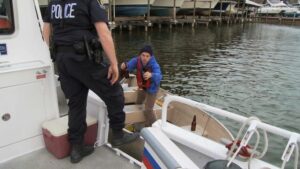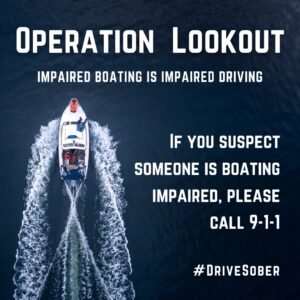2022-May-30
OPP and Arrive Alive Remind Boaters that Impaired Boating is Impaired Driving
The OPP and Arrive Alive want boaters to remember that whether it’s in a car or a vessel impaired driving is impaired driving and the penalties are the same. With the sun, winds, sounds, and motion on the water, the effects of alcohol and drugs on a boat can be much greater than on land. Boating while impaired is just as dangerous – and just as illegal – as driving a vehicle while impaired.
 What is impaired driving?
What is impaired driving?
Impaired driving means operating a vehicle while your ability to do so has been compromised to any degree by the consumption of:
-
- alcohol
- drugs including:
- cannabis
- over-the-counter drugs
- prescription medication
- illegal substances
- any combination of the above
In addition to driving cars and trucks, impaired driving laws also apply to those operating snowmobiles, off-road vehicles, and boats including all power, paddle, and sail craft,
If police determine that you have drugs or alcohol in your system and/or that you are impaired by any substance, you can face severe consequences and potential criminal charges.
The Dangers of Impairment on the Water
When you are impaired, your decision making skills, motor skills and reaction time are all compromised which may impede your ability to respond to a difficult situation should you find yourself in one. The effects of sun, wind and waves, known as boater fatigue can also quadruple the effects of impairment. Other effects of drug and alcohol consumption include:
- Diminished judgment and ability to process information
- Slower reaction and reflex response times, including slower breathing reflexes
- Reduced motor skills, peripheral vision and balance which puts you at greater risk of falling overboard
- Poorer depth perception, vision and focus
- Accelerated risk of hypothermia as alcohol and drugs will lower the body’s resistance to cold
Penalties
Police have tools and tests to detect impaired drivers, including roadside drug screening equipment and sobriety tests. If the police determine that you are driving while impaired, you can face:
-
- immediate licence suspensions

- fines and reinstatement fees
- enrollment into education or treatment programs
- vehicle impoundment
- harsher penalties upon conviction
- immediate licence suspensions
Penalties can vary depending on your age, licence type, the amount of alcohol or drugs in your system, and how many times you have been convicted or had your licence suspended. You can face charges if your blood alcohol concentration is 0.08 or more, or if you are in the warn range (blood alcohol concentration between 0.05 and 0.079).
Under Ontario’s zero tolerance law for young, novice and commercial drivers, you cannot have any alcohol in your system if you are:
-
- age 21 or under
- a driver of any age who holds a G1, G2, M1, or M2 licence
Please BOAT SOBER!
